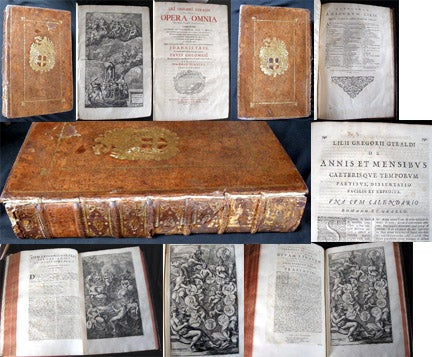
Opera Omnia Duobus Tomis Distincta, Complectentia Historiam De Deis Gentium, Musis Et Hercule, Rem Nauticam, Sepulcralia, et Varios Sepeliendi Ritus, Historiam Poetarum Graecorum et Latinorum, Kalendarium Romanum et Graecum Cum Libello De Annis, Mensibus.
Lugduni Batavorum: Hackium, Boutesteyn, Vivie, Vander AA, & Lucthmans, 1696. F. Two volumes bound in one of this first collected edition of Giraldi's works; (20) + 772 + (26) + 928 + (30) pages Index Rerum et Verborum + (1) page Catalogus Amicorum Lilii, Quorum Meminit in epistola Direptionis Urbanae...; paginated in two columns, except for the 'Varia' section; collated complete; text printed double-column; engraved illustrated frontispiece + 7 full page and 2 double-page plates, beautifully accomplished by Avele after Botard, superb engravers' work, with full and lively compositions, realistically posed and drawn with action; title page with publishers' woodcut ornament and printed in red and black; the text with title and endpiece ornamentation and initial ornamentation as well, nicely printed and with good wide margins; 11th ed. Britannica cites Giraldi, Giglio Gregorio (Lilius Gregorius Gyraldus) 1470-1552 Italian scholar and poet, born at Ferrara, "...where he early distinguished himself by his talents and acquirements... he removed to Naples, hwere he lived on familiar terms with Jovianus Pontanus and Sannazaro; and subsequently to Lombardy, where he enjoyed the favour of the Mirandola family. At Miland in 1507 he studied Greek under Chalcondylas; and shortly afterwards, at Modena, he became tutor to Ercole (afterwards Cardinal) Rangone. About the year 1514 he removed to Rome, where, under Clement VII, he held the office of apostolic protonotary; but having in the sack of that city (1527) which almost coincided with the death of his patron Cardinal Rangone, lost all his property, he returned in poverty once more to Mirandola, whence again he was driven by the troubles consequent on the assassination of the reigning prince in 1533. The rest of his life was one long struggle with ill-health, poverty and neglect; and he is alluded to with sorrowful regret by Montaigne in one of his Essais (i. 34) as having, like Sebastian Castalio, ended his days in utter destitution. He died at Ferrara...a man of very extensive erudition; and numerous testimonies to his profundity and accuracy have been given both by contemporary and by later scholars. His Historia... marked a distinctly forward step in the systematic study of classical mythology; and by his treatises De Annis et Mensibus, and on the Calendarium..., he contributed to bring about the reform of the calendar, which was ultimately effected by Pope Gregory XIII...Giraldi was also an elegant Latin poet."; approximately 15" tall by 10"; bound in full, probably contemporary leather; seven raised spine bands, gilt floral roll tool rectangles with fruit & leafy spray devices at corner of inner box surrounding a heavily-impressed and complex gilt central device with heroic figure surrounded by winged angel figures & cherubs, figure holding a spear and a book, shield below with cross device and the motto Sic Itur Ad Astra (onward to the heavens); all edges tinted red; spine leather covering 1/3 gone, very charred and worn; both boards still attached and the binding firm; first leaves a bit maladjusted at the inner margin, from the heaviness of the binding pulling at them; text block with some spotting and darkening, section at back with old bit of creasing at top corners; nevertheless, mostly very fresh and clean, free from markings or wear; in good condition and worthy of a rebacking or rebinding. Item #19590
Price: $2,500.00

